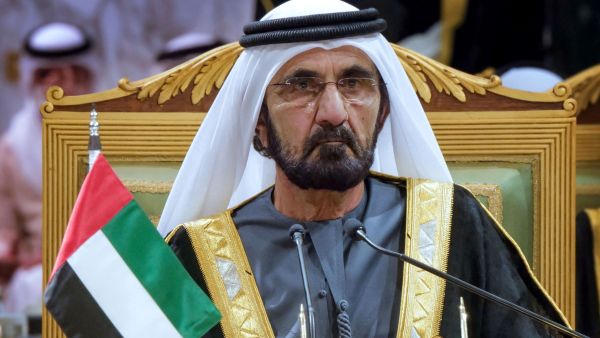ALBAWABA - Sheikh Mohammed bin Rashid Al Maktoum, the Vice President of the United Arab Emirates and the Prime Minister, has approved the general budget of the government of Dubai for the fiscal years 2024-2026, with a total expenditure of AED 246.6 billion, according to the Dubai Media Office.
Sheikh Hamdan bin Mohammed bin Rashid Al Maktoum, the Crown Prince of Dubai and Chairman of the Executive Council of Dubai, stated, "The 2024-2026 budget sets a financial roadmap to accelerate Dubai's ambitions in enhancing the growth of its vital sectors and reaffirming its position as a global economic hub... The new budget reflects Sheikh Mohammed bin Rashid Al Maktoum's vision to achieve a set of strategic goals for the upcoming phase, including doubling Dubai's GDP and making it one of the top three economic cities in the world in the next ten years, while also committing to achieving a balance between the lofty ambitions, economic growth, and stability, supported by sound fiscal policies," according to the official website of the Ruler of Dubai.
He added, "The budget emphasizes support for key sectors crucial for the future and the transition to a new phase of knowledge-based growth driven by innovation in the new digital world, while enhancing opportunities for local entrepreneurship and creating a high-growth environment for all sectors... Furthermore, the financial sustainability and competitiveness affirmed by the budget increase Dubai's attractiveness to investors and businesses from around the world, providing an ideal launching point for Dubai to realize its aspirations in building a prosperous future."
Supporting Projects and Stimulating the Economy
The estimated expenses for the fiscal year 2024 amount to AED 79.1 billion, demonstrating the Emirate's determination to support development projects, stimulate the overall economy, and achieve the ambitious goals of Dubai 2030 and Dubai's economic agenda D33. Dubai continues to prioritize social services and the development of the healthcare, education, culture, and infrastructure sectors in the 2024 fiscal budget.
The 2024-2026 budget cycle reflects Dubai's vision for the future by supporting space research, digitalization, and artificial intelligence. It also places emphasis on entrepreneurship and creating a stimulating environment for various sectors in the emirate.
A Flexible Plan
Abdulrahman Saleh Al Saleh, the Director-General of the Financial Department, emphasized the importance of announcing a flexible and adaptable financial plan that would ensure financial sustainability for the government. It aims to increase competitiveness and transparency, which in turn enhances Dubai's appeal to foreign investments.
He stated that the fiscal budget for 2024, with a total expenditure of AED 79.1 billion, is aligned with the requirements of Dubai's Strategic Plan 2030 and the goals of Dubai's economic agenda D33. The government is committed to following the directives of Sheikh Maktoum bin Mohammed bin Rashid Al Maktoum, the Deputy Prime Minister and Minister of Finance, regarding the adoption of disciplined fiscal policies. This has led to the establishment of a general reserve fund deducted from annual revenues, which is expected to reach approximately AED 20.6 billion for the years 2024-2026. Additionally, the surplus generated annually is reserved by the Dubai High Fiscal Policy Committee under the leadership of Sheikh Ahmed bin Saeed Al Maktoum. These measures ensure financial sustainability and strengthen the emirate's financial position to face any future crises.
He added, "The Financial Department expects to achieve an operational surplus of up to 3.3 percent of the total GDP during the implementation of the 2024-2026 financial plan, in order to establish the foundations of financial sustainability for the emirate."
Expected Government Revenues for the Fiscal Year 2024
The Director-General of the Financial Department clarified that Dubai anticipates general revenues amounting to AED 90.6 billion, of which AED 85.1 billion is allocated to the budget, and AED 5.5 billion to the general reserve. He confirmed that the increase in revenues is the result of swift measures taken to recover from the global pandemic and their efficiency, along with the professional and proactive handling of global events.
Expected Government Expenditure for the Fiscal Year 2024
Abdulrahman Saleh Al Saleh pointed out that announcing expenditures totaling AED 79.1 billion in the fiscal budget for 2024 sends a clear message to the business community. This message is that Dubai follows an expansionary fiscal policy, instilling significant confidence in the emirate's economy and attracting more direct investments.
Salaries and wages make up 26 percent of the total government expenditures, while grants and government support account for 23 percent, and general and administrative expenses make up 24 percent of the total government expenditures.
Despite the completion of many strategic projects and the activation of the public-private partnership law, Dubai's government has allocated 8 percent of the total government spending to construction projects. This is a clear indication of the commitment to continue developing the infrastructure and launching developmental projects.
The budget also includes a special reserve of 8 percent of the expected total expenditures, in preparation for emergency situations during the implementation of the financial plan in various sectors and activities.
Dubai has maintained a debt service ratio that does not exceed 7 percent of its total expenditures, which does not pose any obstacles to the emirate's public finances, thanks to its disciplined fiscal policy.
Sectoral Distribution of Government Expenditure for the Fiscal Year 2024
The 2024 fiscal budget reflects the government's focus on human development, allocating 34 percent of total government spending to the social development sector, encompassing health, education, scientific research, housing, caring for needy families, women, children, youth, sports, the elderly, retirees, and people with disabilities.
The government has also shown significant interest in the security, justice, and safety sector, dedicating 19 percent of total spending to support and develop it, making it one of the sectors that the emirate proudly showcases on the global stage.
Expenditure on infrastructure, including roads, tunnels, bridges, transportation means, sewage stations, parks, recreational areas, renewable energy stations, and waste treatment, accounts for 42 percent of the government's total expenditure. Dubai also supports public service, government excellence, innovation, and scientific research by allocating 5 percent of total government spending to enhance performance and instill a culture of excellence and innovation.
Efficient Spending and Meeting Requirements
Aref Abdulrahman Ahli, the Executive Director of the Planning and General Budget Sector in the Financial Department, pointed out that Dubai's adoption of medium-term financial planning and the declaration of a three-year financial plan align with the vision of Dubai's ruler and the directives of the Crown Prince of Dubai.
Ahli stated that the fiscal budget for 2024 meets the requirements of Dubai's Strategic Plan 2030 and beyond, transparently demonstrating the emirate's stable financial position. This is achieved by implementing disciplined fiscal policies based on best practices, leading to a 16 percent operational surplus of total government revenues, contributing to the emirate's desired financial sustainability.
He added, "The Financial Department is continuously working on developing government spending efficiency programs by activating the Unified Procurement Program, Green Procurement, and stimulating partnerships with the private sector. It has also launched a program to develop the program and performance budget, which links strategic planning to financial planning, confirming Dubai's commitment to principles of leadership and transparency. Government entities are today contributing to bringing the budget to international standards in terms of preparation and performance ratios, as evidenced by the highest scores achieved in budget execution in previous years, according to the Global Public Expenditure and Financial Accountability (PEFA) program."
Enhancing Transparency
Jamal Hamed Al Marri, the Executive Director of the Central Accounts Sector at the Financial Department, highlighted the department's efforts to promote development and innovation by enhancing revenue collection programs. He mentioned a 22 percent increase in smart collection through digital channels in 2022 compared to the previous year.
Al Marri confirmed that the Dubai government prioritizes disseminating financial data and promoting transparency. The Financial Data Platform contributes to making financial data available to governments, institutions, and individuals, increasing the emirate's competitiveness.
He added, "The Financial Department is continuously working on developing programs that elevate the public financial system and achieve financial excellence, such as applying International Public Sector Accounting Standards (IPSAS). This has made Dubai one of the first governments in the region to implement these standards, which will have the most significant impact on displaying budget execution results and developing distinguished government performance."







